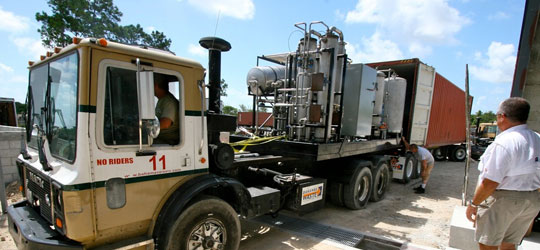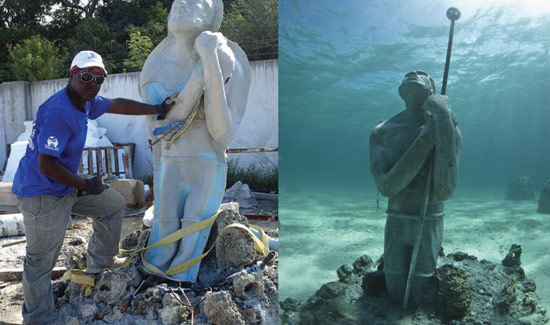
Nassau, The Bahamas — A $600,000 biodiesel plant was installed at Bahamas Waste Gladstone Road headquarters on August 19 to recycle used cooking oil and turn it into car fuel.
The equipment arrived within a year of the BEST Commission’s approval of planning the nation’s transition to alternative energies.
“What we are seeing is the process which began a number of years ago, when we began the formulation of the National Energy Policy,” said the Hon. Phenton Neymour, Minister of State for the Environment.
“We recognised in The Bahamas that there is an opportunity for us to use cooking oil to generate biodiesel and therefore generate energy.
What we are seeing is Bahamas Waste in fact making the waste collection system in New Providence more green and so we are very proud of them.” Bahamas Waste is spearheading the government’s conservation initiatives by using “Green Energy” to power their vehicles.
The biodiesel fuel produced at the plant will also be used in the garbage trucks as an alternative to gas during their route collection.
“I would also like to thank the National Energy Policy Committee who recognised the opportunity and the BEST Commission, who worked along with Bahamas Waste in coming together with the design,” said Mr. Neymour. “It was an example of where the government agencies and the private sector could work closely together and work efficiently together to come up with a product like this.”
Biodiesel production is expected to begin within a matter of a few weeks.
It completes one of the goals of Minister Neymour, the BEST Commission, and the National Energy Policy, to set Bahamians on the path of conserving energy by cost effectively recycling waste resources.
“It also demonstrates to The Bahamas that we have the capability here and we have the private sectors willing to participate in a venture such as this,” said Mr. Neymour. John Wanklyn, project manager, gave a brief tour of the site and explained how the fuel recycling system will work.
“This building and equipment can produce on a normal cycle of twelve hours a day 500,000 gallons of pure biodiesel per year or 2.3 gallons per minute,” said Mr. Wanklyn. Environment Minister Earl Deveaux commended Minister Neymour for completing the BEST Commission’s goal and pointed out the new opportunities for growth in biodiesel production.
“The Island School in South Eleuthera produces biodiesel and they use it in their plant.
I want you to pay particular attention to the innovative technology, the range of skills, and the opportunity this represents to integrate bringing back some of our exported dollars,” said Minister Deveaux.
“We spend our money buying cooking oil and we produce a residual that could go into another stream of use, other than the waste stream.
This helps us entrap a great value in our economy and it helps in reducing our energy load.
I believe Bahamas Waste will find it will extend the engine life of its vehicles.” Minister Deveaux suggested that as Bahamas Waste expands the biodiesel industry, it would go into recycling other by products such as waste engine oil.
Recycling poses a solution to many of the huge environmental problems we face with controlling the accumulation of wasted non-recycled oil.
“The final point I want to make is how closely the government and the private sector has to work, if we are to achieve any degree of energy security.
The government could not have financed something of this nature,” said Dr. Deveaux.
By Gena Gibbs
Bahamas Information Services



